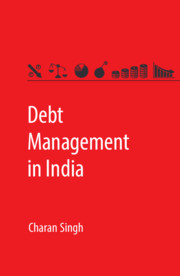Book contents
- Frontmatter
- Contents
- List of Tables and Figures
- Preface
- 1 Introduction
- 2 Public Debt in India
- 3 Ricardian Equivalence: Introduction
- 4 Ricardian Equivalence: Empirical Studies Utilising Consumption Function
- 5 Ricardian Equivalence and Consumption in India
- 6 Monetisation of Debt in India
- 7 Domestic Debt and Economic Growth in India
- 8 Separation of Debt from Monetary Management
- 9 Conclusions and Policy Implications
- Bibliography
- Index
Preface
Published online by Cambridge University Press: 23 November 2018
- Frontmatter
- Contents
- List of Tables and Figures
- Preface
- 1 Introduction
- 2 Public Debt in India
- 3 Ricardian Equivalence: Introduction
- 4 Ricardian Equivalence: Empirical Studies Utilising Consumption Function
- 5 Ricardian Equivalence and Consumption in India
- 6 Monetisation of Debt in India
- 7 Domestic Debt and Economic Growth in India
- 8 Separation of Debt from Monetary Management
- 9 Conclusions and Policy Implications
- Bibliography
- Index
Summary
In India, fiscal policy has undergone significant changes since start of the planning era in 1951. Initially, external debt played an important role but by 1970s, India became aware of the risks associated with borrowings from external sector. The development process, requiring significant amount of financial resources was financed by domestic sources. The rising domestic debt led to high interest payments pre-empting resources for investment purposes, given the constraint of limited taxable capacity of the economy. Soon, the discussion on having a fiscal rule resulted in legislations at the centre and states.
The debt management is done by the Reserve Bank of India (RBI), the monetary authority of India. To ensure independence of monetary policy and transparency in debt management, the key issue of separating debt from monetary management was extensively discussed. The initial steps of separating the two functions were taken hesitantly and even those were stalled when the great recession of 2008 occurred. RBI argued against the separation, given the fragile economic situation, domestically and globally.
I have been part of the fascinating story of debt management in India from 1987 onwards when I was introduced to the subject by Professor I. S. Gulati. This book is a result of my academic research for about a decade, and then working in the Debt Management Department of RBI for more than five years, first in the initial stages and then as Director of Research. The experience and interaction with the best minds in the country, nay the world, is unparalleled. Hence, I owe my sincerest gratitude to my professors and colleagues.
I also would like to thank Cambridge University Press for persistently pursuing me and ensuring that I publish this work on Debt Management in India.
- Type
- Chapter
- Information
- Debt Management in India , pp. xi - xiiPublisher: Cambridge University PressPrint publication year: 2018



